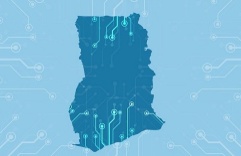Business News of Wednesday, 2 April 2025
Source: www.ghanawebbers.com
The digitalization agenda: The good, the bad, and the ugly

This analysis looks at Ghana’s digital transformation journey. It highlights the positive aspects, challenges, and risks involved.
**The Good: Catalyzing Growth and Innovation**
Ghana's digitalization has brought significant benefits across various sectors.
**Improved Governance and Public Service Delivery**
The Ghana Card is key to this agenda. It simplifies identification for public services, banking, and taxes. This biometric ID reduces fraud and boosts government efficiency.
The Paperless Port System has also improved operations. It increased transparency while reducing corruption and delays. A report shows port revenues rose by 35% from 2018 to 2022 due to this digitization.
**Financial Inclusion and a Cash-Lite Economy**
Ghana leads in mobile money interoperability. This allows easy transfers between wallets and bank accounts. Millions now access formal financial services, especially in rural areas.
According to the Bank of Ghana’s 2022 report, over 40 million mobile money accounts exist. This growth boosts economic activity and decreases cash reliance.
**Economic and Sectoral Transformation**
In agriculture, platforms like Esoko help farmers with market prices and forecasts. In healthcare, e-health initiatives improve patient care in underserved areas.
Education programs introduce coding and digital literacy to thousands of students. These efforts prepare them for future job markets.
**Cybersecurity Improvements**
The Cyber Security Authority (CSA) was established in 2021. It strengthens cybersecurity through awareness campaigns and data protection enforcement.
**Broader Connectivity through ICT Infrastructure**
The Ghana Investment Fund for Electronic Communications (GIFEC) connects over 4,000 communities to the internet. Efforts are underway to expand the national fiber optic network for better broadband access.
---
**The Bad: Persistent Challenges Hindering Progress**
Despite progress, several challenges remain that hinder full realization of the digital agenda.
**Limited Access and Affordability**
Internet services are still too expensive for many Ghanaians, especially in rural areas. The e-levy on digital transactions discourages mobile money use among low-income earners.
**Rural-Urban and Gender Gaps**
Rural areas often lack reliable internet connectivity or electricity. Women are underrepresented in ICT careers as well.
**Cybersecurity Gaps and Rising Threats**
Digital service expansion has led to more cyberattacks and fraud cases. Many businesses lack tools or knowledge for online protection despite CSA efforts.
**Implementation Delays and Bureaucratic Hurdles**
Projects like land record digitization have faced delays that reduce their impact. Poor coordination slows progress in healthcare digitization too.
**Digital Literacy Deficit**
Many citizens lack skills to use digital tools effectively, especially in rural areas. Public education on cybersecurity remains inadequate as well.
---
**The Ugly: Unintended Consequences and Risks**
Digitalization has revealed troubling outcomes that could undermine its benefits.
**Privacy Concerns**
Extensive personal data collection raises fears about misuse or unauthorized access. Weak enforcement of data protection laws increases concerns about surveillance violations.
**Corruption Issues**
Allegations of inflated budgets have affected some digital projects negatively. Weak accountability mechanisms risk diverting funds from essential initiatives.
**Exclusion of Vulnerable Groups**
Rapid digitalization may exclude vulnerable groups like the elderly or disabled individuals. Automation can lead to job losses among low-skilled workers too.
**Dependency on External Partners**
Heavy reliance on foreign companies raises concerns about data sovereignty long-term sustainability issues arise as well.
---
**The Way Forward: Building a Resilient Digital Ecosystem**
To harness its potential fully, Ghana must address these challenges strategically:
1. **Expand Digital Access:**
Reduce costs through subsidies for internet services.
Prioritize connectivity projects in rural areas.
2. **Foster Inclusivity:**
Encourage gender equality through scholarships for women.
Tailor programs for underserved populations including those with disabilities.
3. **Strengthen Cybersecurity:**
Enhance CSA's capacity against cyber threats.
Educate the public on online safety rigorously.
4. **Improve Governance:**
Establish monitoring frameworks for transparency in projects.
Ensure timely implementation of key initiatives like land digitization.
5. **Encourage Local Innovation:**
Support local tech startups developing homegrown solutions.
---
In conclusion, Ghana's digital agenda is transformative but faces persistent challenges that need addressing urgently. By ensuring inclusivity, affordability, and security, Ghana can build a resilient ecosystem that fosters growth while improving citizens' quality of life.










